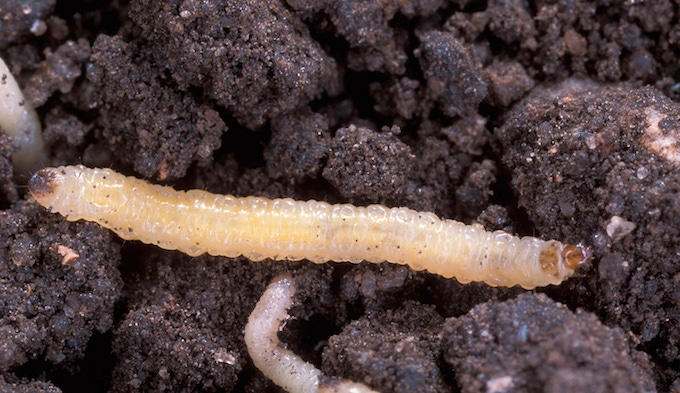June 27, 2013

While there are traits and products to help you protect your corn crops against corn rootworm, you still need to manage against the pest and that means knowing about larvae and adult beetle populations in your fields. According to experts from DuPont Pioneer, scouting corn fields to keep tabs on rootworm populations is essential to protecting your corn crop against rootworm damage.
“Wet soils and cooler temps challenged the growth of corn early this year. These conditions may have also controlled early-hatching larvae by reducing their food source and saturating the soils,” says Clint Pilcher, DuPont Pioneer insect resistance management expert. “Regardless, growers should still scout their fields to check on the effectiveness of their control program and plan accordingly if they have severe problems.”
Like what you're reading? Subscribe to CSD Extra and get the latest news right to your inbox!
The goal is to break the rootworm cycle and manage the population. Options for corn rootworm include rotating crops, alternating traits or stacks within planted corn hybrids, enhancing control with insecticide seed treatments and soil-applied insecticides, or spraying adult beetles during silking.
In-Season Scouting
Adult beetles impact grain fill by chewing off the green silks, causing spotty pollination later in the season. The larval stage, however, is the most damaging and impacts yield by feeding on corn roots. One way to determine the current level of rootworm pressure and the potential for future threats is to scout your fields for adult beetles in July and August. Scouting helps determine whether to spray the current crop and limit the potential for population outbreaks the next crop season. When scouting, look for lodged plants with heavy damage on the root system.
To ensure that spraying rootworm beetles will pay off, determine that the critical population threshold has been met before using an insecticide. This guideline is location specific, so consult your local DuPont Pioneer agronomist or Pioneer sales professional for corn rootworm beetle threshold levels in your area. If the threshold is met, apply timely foliar insecticides to control the egg-laying adult population.
Planning for Next Year
After following these recommendations, it’s important to begin thinking ahead about controlling corn rootworm for the next crop, which includes following programs that preserve corn rootworm control traits for the long term.
“The best thing growers can do to help eliminate rootworm pressure is to rotate to another crop, such as soybeans,” Pilcher states. “Corn rootworms love corn-on-corn, so anything growers can do to break that cycle is best.”
If there is no opportunity to rotate a field to another crop, consider a product with multiple modes of action in corn rootworm-resistant traits. Research has shown that integrated refuge, like Optimum AcreMax products, is best for insect resistance management of corn rootworms. If the same mode of action has been continually used to manage rootworm pressure, consider another trait or pyramid products to help break the cycle.
Another preseason management option, when planting continuous corn-on-corn in regions of extremely heavy rootworm pressure, is a soil-applied insecticide in combination with an Optimum AcreMax product, but Pioneer does not make this a standard recommendation.
“Corn rootworms are becoming more and more difficult to manage, so we as an industry need to be cognizant of the practices we use,” Pilcher reports. “If we want to use these practices and products long term, they need to be managed properly.”
If using a blended, in-bag refuge product is not an option for you then a structured refuge is required in combination with certain Bt-rootworm products. Practicing good stewardship like planting a refuge is vital in helping maintain a population of corn pests that are susceptible to resistance traits. In the long-term this will help preserve the viability of insect protection for in-plant traits.
When it comes to keeping insect control solutions for years to come, rotating products or crops are the best options. You can also work with your local Pioneer sales professional or DuPont Pioneer agronomist to develop a long-term plan that fits your acres.
You might also like:
Scout for Early-Season Soybean Diseases
You May Also Like




